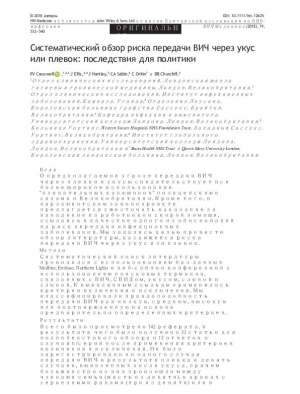Систематический обзор риска передачи ВИЧ через укус или плевок: последствия для политики
Систематический поиск литературы проводился с использованием баз данных Medline, Embase и Northern Lights, а также сайтов конференций. Результаты показали, что риск передачи ВИЧ через слюну отсутствует, а риск через укус ничтожно мал. Постконтактная профилактика не показана после укуса во всех случаях, кроме исключительных. Политику защиты работников экстренных служб следует разрабатывать с учетом этих данных.
Этот документ был переведен с языка оригинала с помощью DeepL Pro (технологии перевода на основе искусственного интеллекта), чтобы обеспечить доступ пользователей Академии правосудия по ВИЧ к большему объему контента. Мы отдаем себе отчет в ограниченных возможностях машинного перевода и не гарантируем точности переведенной версии документа
- Alternative links
- English

